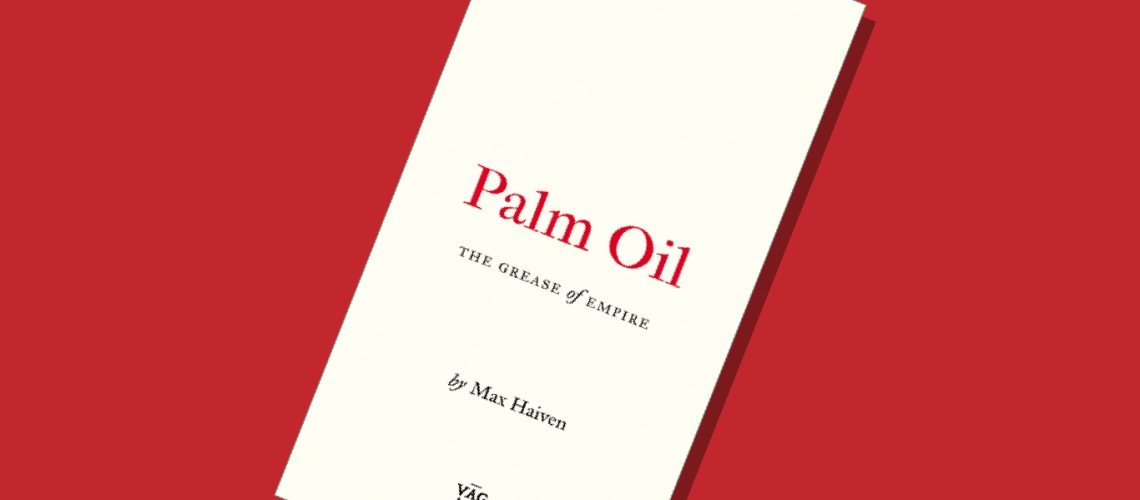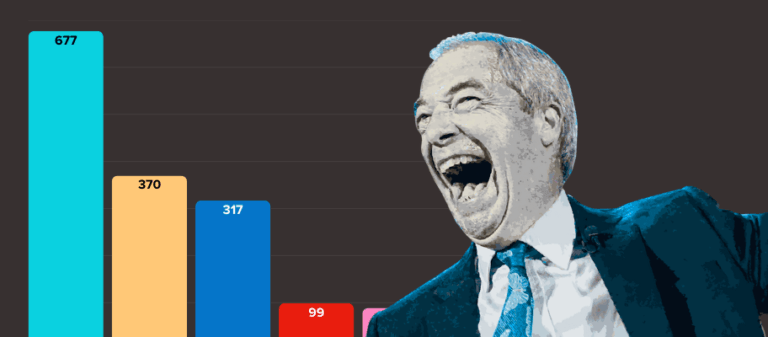Most people know that palm oil is bad; its production kills orangutans and its excessive consumption causes weight gain and increases health risks. But few realise the extent to which palm oil has powered the industrial revolution and shaped the modern world beyond imagination.
Max Haiven, Research Chair in the Radical Imagination at Lakehead University, Canada, in his newest book Palm Oil, sheds light on the intricate web of palm oil production and consumption. The book, published by Pluto Press in April 2022, traces the story of palm oil from its expropriation by European colonisers to the modern-day epicentre of its production in Malaysia and Indonesia. It shows that by following the trails of palm oil, we can start to disentangle the web of capitalism itself.
Colonial roots
The story begins in the Edo Kingdom, located in present-day Nigeria. It was a highly sophisticated albeit stratified society, whose wealth was built on the oil palm Elaeis guineensis. The original, unprocessed palm oil is red, fleshy, and fragrant, and carries cultural meaning in Africa and its diaspora.
The English started exporting it first from the boards of their ships safely docked in the ports of the Edo Kingdom. Many of them were merchants from Liverpool, who turned to this market after the Empire started restricting the trade of enslaved people in 1807. Carried on the ships, the oil flowed through Liverpool, London, and Bristol, and “greased the wheels of the Industrial Revolution”. It was thanks to palm oil, used as industrial lubricant, that all the machines, railway locomotives, and steamship engines ran smoothly.
In the 19th century, palm oil was a crucial ingredient in candles, tin cans, soap, and edible margarine. You will recognise the characteristic capital U of the company Unilever, the largest producer of soap in the world and one of the largest consumers of refined palm oil. Its predecessor, Lever, established vast plantations of palm oil in Congo, then colonised and oppressed by Belgium.
Haiven then turns his sight to Britain’s 1897 Benin Punitive Expedition. Benin used to be the capital of the Edo Kingdom, and it was burnt to the ground by the British Empire along with the rest of the kingdom. The British were no longer content with dealing just with local middlemen when extracting palm oil from Africa; they wanted to have full control over the production process, desecrate the resource held in high regard in the Edo Kingdom, cut out the middlemen, and intensify production. To pay for the costs of the military expedition, the troops confiscated and sold off the infamous Benin Bronzes, which can still be seen in the British Museum today.
The hypocrisy of human sacrifice
Here, Haiven points to the excuse the British government gave to justify the military conquest of the Edo Kingdom. It was all because of human sacrifice, allegedly practised by the local authority. Although sources on the extent of the practice vary and most experts agree that it was intentionally exaggerated by the Empire, it was thousands and thousands of people from the Edo Kingdom, as Haiven argues, who were in the end sacrificed on the altar of capital and profit accumulation.
Haiven sharply criticises the logic of capitalism, which considers itself beyond the so-called primitive and irrational logic of the world outside of Europe. European colonisers criticised the Edo Kingdom elites for believing that “certain sacred objects endowed them with special powers” and “validated their sacred social rank and arbitrary authority”, which extended to the practice of human sacrifice. At the same time, Haiven points out, the colonisers and early capitalists were (as today’s capitalists still are) all bowing down to the divine logic of the free market and were willing to sacrifice the lives and livelihoods of millions of people for increased profit. Not to mention it is the British who still have a monarchy in the 21st century, which is legitimised through their divine right to rule and their blue blood.
Haiven explains human sacrifice practised by the elites as “a kind of cosmic insurance: a relatively small, judicious investment made now in the name of averting the potential of future catastrophe”. What is the difference though between sacrificing a person to appease the gods and telling people to tighten their belts, not to ask for pay increases in line with inflation, and pay whatever your landlord asks for, all to appease the market, preserve profits, and avoid recession?
The fat of the poor
After people overcame palm oil’s association with industrial machines and soap, it spread like wildfire through the food production industry in the form of food additives that helped extend shelf life, cheapened the price of ultra-processed food and pre-packaged meals, and facilitated distribution worldwide. Haiven writes that “palm oil or its derivatives are present in over 50% of supermarket products”, and “it can appear under some 200 different names”.
Palm oil, especially the unrefined kind and when eaten in moderation, can help protect brain function, reduce the risk of heart disease, and supply our bodies with vitamin A. However, there are two factors behind its unhealthy reputation. Firstly, because of its universal use in ultra-processed foods (everything that has gone through significant changes from its original state), the quantity of palm oil we consume can have adverse effects on our health, especially on the cardiovascular system. And we eat a lot of it. Ultra-processed food makes up half of people’s diet in the UK – more than anywhere else in Europe. Secondly, the more ultra-processed food we eat, the poorer and more nutrient-deficient our diet is, and therefore the risk to our health grows.
Its widespread use of palm oil and the nature of ready-made and ultra-processed foods that contain it severely impact the prevalence of heart disease, diabetes, and other chronic health issues. Because of its high content in the cheap ultra-processed foods, in many places, it is the primary cooking oil of people living in poverty.
It is likewise one of the main components of the diet of the ultra-exploited workforce in the new industrial hubs in Asia that supply the majority of cheap consumer goods for the US and Europe, as well as the American prison industrial complex. In both instances, the severely underpaid (if at all paid) workers live off and get energy for their labour from ultra-processed food, such as instant ramen noodles. Without palm oil and its extremely low price driven down by super-exploitative conditions on the plantations, the wheels of industrial production would stop turning, as workers would have to find another source of nutrition and energy.
While Europe is mostly unknowingly dependent on palm oil as the source of energy for the workforce providing them with cheap clothes, electronics, and everything else, here at home, palm oil is frowned upon; it is advisable to buy more expensive food that does not contain it.
Here in Scotland, there is a moral panic about excess weight, which puts the blame for high obesity rates on individual people and their poor choices rather than on the system of low income, poor housing, and a lack of affordable healthy food. The solution of the Scottish government is to restrict the promotion of unhealthy foods like ready meals, chips, breakfast cereal, cooking sauces, and many more – most of which contain palm oil.
A way out
We cannot escape palm oil. Haiven says we are alchemically palm oil now. The way forward and out of the colonial ties of the palm oil industry, its destruction of the environment, and the exploitation of workers will require nothing short of dismantling the entire system. Boycotts of such a ubiquitous ingredient are inefficient if not pointless and only promote the notion that white consumers will save the rest of the world with their consumer choices. Regulation is equally as ineffective as the responsibility is distributed so widely, repercussions rarely materialise for the atrocities to the environment and the working conditions.
Haiven therefore asks: “What would it take to create a world which no longer perceived itself to need industrially produced palm oil?”
Further resources:
Palm Oil: The Grease of Empire – Max Haiven (YouTube)
Check out Haiven’s overview of his book in this 30-minute lecture.
Far from Ukraine, Putin’s War Worsens Palm Oil Crisis (Boston Review)
Haiven also wrote an article on the impact of Russia’s war on the palm oil industry.






